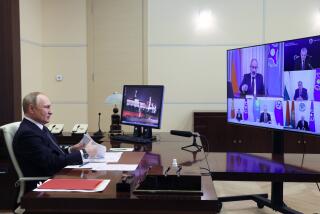Soviets Name New Envoy to Push Afghan Settlement
- Share via
MOSCOW — A top Soviet diplomat was appointed ambassador to Afghanistan on Thursday with the mission of negotiating a political settlement of that country’s prolonged civil war.
Yuli M. Vorontsov, Moscow’s foremost international trouble-shooter, will depart shortly for the Afghan capital of Kabul, the Soviet Foreign Ministry announced.
The appointment appears to be part of a major Kremlin effort to ensure political stability after it withdraws the balance of its forces from Afghanistan early next year.
Foreign Ministry spokesman Gennady I. Gerasimov, recalling Soviet President Mikhail S. Gorbachev’s description of the Afghanistan war as a “bleeding wound,” said Moscow saw the “need for a highly skilled healer” there.
But the appointment of Vorontsov, coming after Moscow’s commitment Wednesday of $600 million to a United Nations program to resettle more than 5 million Afghan refugees now living in Pakistan and Iran, also underlines the Soviet Union’s determination not to abandon the present regime in Kabul as the rebel Muslims, the moujahedeen , step up their attacks.
According to Soviet sources, Vorontsov’s assignment will be to draw opposition factions, including some of the moujahedeen , into a new government of national unity in a move that would end most of the fighting.
He will clearly have considerable authority to negotiate with the moujahedeen , with Pakistan and the United States, which support them, and with the Kabul government. He replaces Nikolai Yegorychev.
Vorontsov will also need to press Kabul to make the concessions necessary to bring at least some of the opposition groups into the government, and diplomats say that the growing feud between the rival factions of the ruling People’s Democratic Party will make that a difficult task.
Vorontsov’s appointment was reportedly decided on by the Communist Party’s ruling Politburo. It led to speculation among Western diplomats that it and the unprecedented donation to the U.N. refugee program are just the initial steps in a more elaborate plan to ensure an acceptable outcome for Moscow, which is committed to withdrawing all of its forces by mid-February.
“There must be a political settlement, and we are still hopeful that it can be obtained,” an experienced Soviet observer of the region said Thursday. “But the whole process became stalled, largely because of Pakistani and American support for moujahedeen offensives as Soviet troops pulled out. Those attacks have had very limited success militarily, but they have prevented a political movement. That’s what brings us to Yuli Vorontsov.”
Soviet intentions were obscured, however, by the increasing reluctance of officials and the press to go beyond the briefest accounts of recent developments in Afghanistan. Moscow’s extraordinary donation to the U.N. refugee program, for example, went unreported here Thursday, perhaps because of sensitivity over so large a gift when circumstances are in such straits at home.
Vorontsov, who will retain his post as first deputy foreign minister while serving as ambassador in Kabul, was the key Soviet negotiator in the agreement signed in Geneva last April that called for the phased withdrawal of the Soviet Union’s 115,000 troops from Afghanistan, a process now about half-complete.
He has also served as the Soviet ambassador to France and to India, as the head of Moscow’s delegation to the European Security Conference and as the chief Soviet negotiator at the Soviet-American disarmament talks in Geneva, where he played a key role in formulating the U.S.-Soviet treaty on intermediate-range missiles.
The Kabul government, strongly backed by Moscow, has complained from the outset that Pakistan has violated the Geneva agreement by continuing to arm and assist the moujahedeen with U.S. support. The rebels’ rocket attacks on Kabul and provincial towns have killed more than 700 civilians since April.
More to Read
Sign up for Essential California
The most important California stories and recommendations in your inbox every morning.
You may occasionally receive promotional content from the Los Angeles Times.













